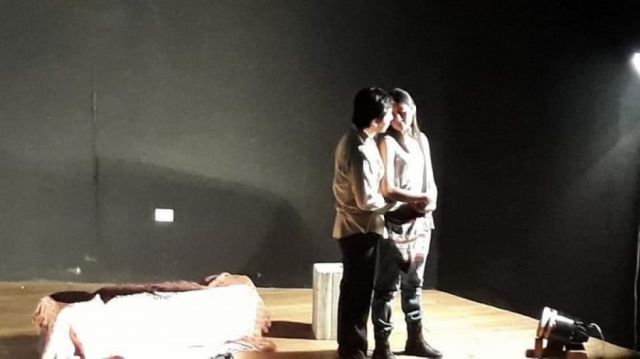Before the Covid-19 pandemic, the group rehearsed from Monday to Friday and had one presentation per month in Tarija
Jësaete is a proposal for dramaturgy within the theater, made up of young people with artistic and cultural experience, it was established in 2018 with seven people in order to create a stable and autonomous theater group in the department. By then they were joining forces and working day by day in order to embrace the future they dreamed of, but the coronavirus pandemic like all people caught them off guard, and now they consider that it will be a challenge to get up again.
Despite this and with all the difficulties that lie ahead, one of the founders Sadid Arancibia made it very clear that to do theater people must be “rebellious and courageous”, because before and after the pandemic, many believe that with art cannot be lived, however, he with a firm voice said that you can get ahead.
Arancibia, who is an actor from Jësaete, is aware that very few people read theater in Tarija, but he hopes that it can be valued, “without some kind of art; be it music, film, theater or books, etc. people would not have been able to cope with the pandemic, “he said. Remember that Jësaete is a Tupiguarani word that means surly, chúcaro. They chose that name because they feel represented, since to do theater in Bolivia they need that attitude.
So far they have three written works, but only one published. The work that was published is called Zero Hours, 23 minutes and 23 seconds.
Your activities
Before the coronavirus pandemic, this talented group rehearsed from Monday to Friday and had one presentation per month in Tarija and in other departments of the country.
After the quarantine, his theater group could not meet to rehearse and make presentations, so they opted and looked for a way to accommodate a screen and spread through social networks, however, he considers that the same visibility is not provided and It does not convey the same feelings either, “everything that the virus rethought for us is difficult, getting up again will be a challenge,” says Arancibia. “The beauty” that they achieved as artists despite the pandemic is that artists from different fields joined and organized in order to receive some kind of help from the authorities, and although it was minimal, they are grateful for it, but also acknowledge that “they had to scratch from other parts in order to survive ”. “Art was essential during the pandemic, after the doctors we were one of the sectors that helped to cope with this disease, without art they would not have been able to withstand the confinement, however, we are one of the sectors that are least supported, in addition, that spaces are taken away from us, as happened at the time with the Ministry of Culture and Sports ”, highlights Arancibia.
Despite the fact that the purpose of the House of Culture is to be able to provide spaces for expression, Arancibia pointed out that it is difficult to access, he hopes that avenues of conversation can be opened, “we do not want them to provide us with spaces for free, but yes at an affordable cost ”. At the moment they are trying to return to their rehearsal activities and then in July and October they will make presentations with “little public” through the play flee or resist.
–
Support independent journalism
You have free access to 200 notes per month. To have unlimited access and many more benefits, purchase your Digital Subscription. Start your Free Trial now
Are you already subscribed? Don’t forget to log in
![]() To access
To access
If you are interested in a corporate or institutional subscription, call us at (+591) 69316133
–
–


